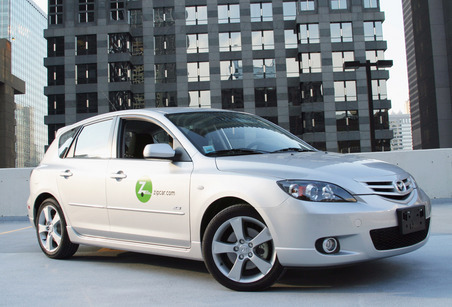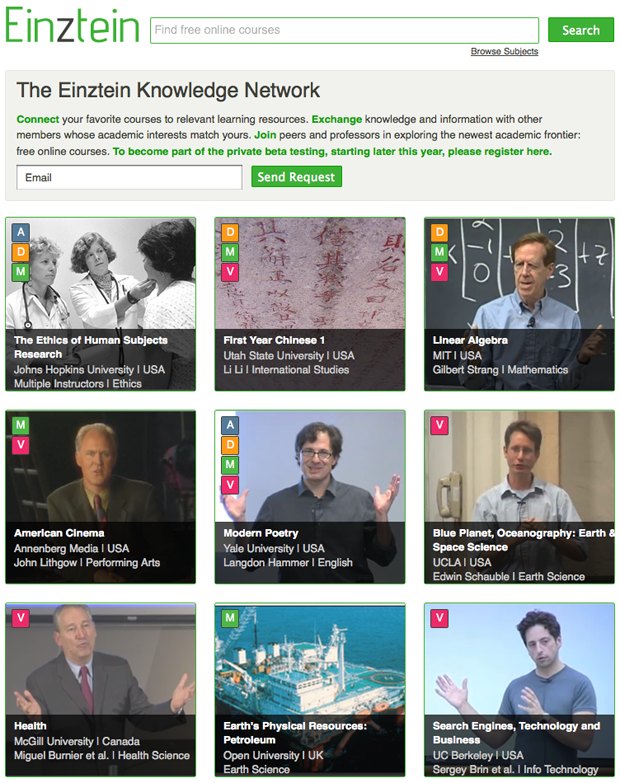 EcoFriend has published its list
of the 10 most transformative biofuel technologies. In no
particular order, the blog’s authors cited:
EcoFriend has published its list
of the 10 most transformative biofuel technologies. In no
particular order, the blog’s authors cited:
1. Nanofarming: a partnership between Ames National Laboratory, Iowa State University, and Catilin to use microscopic materials to havest fatty acids from microalgae without destroying the cells.
2. Transformed tobacco leaves. A project at Thomas Jefferson University to increase oil content in tobacco leaves, making them prospectively viable for biofuels.
innovation DAILY
Here we highlight selected innovation related articles from around the world on a daily basis. These articles related to innovation and funding for innovative companies, and best practices for innovation based economic development.
Canada IPO market luring action
 More than a few Canadian companies are ready to go public, though only a handful - some gutsy tech startups with heavy backing -- are likely to brave the recent market turbulence and take the final step.
More than a few Canadian companies are ready to go public, though only a handful - some gutsy tech startups with heavy backing -- are likely to brave the recent market turbulence and take the final step.
Over the past weeks, initial public stock offerings by Canadian companies have not fared so well, raising less cash than expected in some cases and dropping below their IPO price soon after trading began in others.
Despite months of preparation, sponsors of some issues have pulled or delayed them after prospective buyers proved disinterested.
Silicon Valley Bank's Israel head lauds small VC funds
 Size is not important for venture capital funds, the characteristics of small funds are, Silicon Valley Bank director of Israel operations Naomi Herman told "Globes". "Small funds tend to be more focused and have expertise in a particular field or specific growth stage of companies. Their expertise gives them a better high quality transactions flow than at large funds that invest in a range of industries."
Size is not important for venture capital funds, the characteristics of small funds are, Silicon Valley Bank director of Israel operations Naomi Herman told "Globes". "Small funds tend to be more focused and have expertise in a particular field or specific growth stage of companies. Their expertise gives them a better high quality transactions flow than at large funds that invest in a range of industries."
Herman added, "Small funds also can supplement the abilities of large funds, rather than compete against them. Small funds can set up investment syndicates. Because of their small size, management fees are low and their partners appear to focus on fostering and the success of the portfolio companies."
The Pleasures of Imagination
 How do Americans spend their leisure time? The answer might surprise you. The most common voluntary activity is not eating, drinking alcohol, or taking drugs. It is not socializing with friends, participating in sports, or relaxing with the family. While people sometimes describe sex as their most pleasurable act, time-management studies find that the average American adult devotes just four minutes per day to sex.
How do Americans spend their leisure time? The answer might surprise you. The most common voluntary activity is not eating, drinking alcohol, or taking drugs. It is not socializing with friends, participating in sports, or relaxing with the family. While people sometimes describe sex as their most pleasurable act, time-management studies find that the average American adult devotes just four minutes per day to sex.
Our main leisure activity is, by a long shot, participating in experiences that we know are not real. When we are free to do whatever we want, we retreat to the imagination—to worlds created by others, as with books, movies, video games, and television (over four hours a day for the average American), or to worlds we ourselves create, as when daydreaming and fantasizing. While citizens of other countries might watch less television, studies in England and the rest of Europe find a similar obsession with the unreal.
KAUFFMAN DISSERTATION FELLOWSHIP PROGRAM
T he Ewing Marion Kauffman Foundation is pleased to announce the Kauffman Dissertation Fellowship Program, an initiative of great significance to the faculty and students of your institution. During the 2010-2011 academic year, the Kauffman Foundation will award up to 15 Dissertation Fellowship grants of $20,000 each to Ph.D., D.B.A., or other doctoral students for the support of dissertations in the area of entrepreneurship.
he Ewing Marion Kauffman Foundation is pleased to announce the Kauffman Dissertation Fellowship Program, an initiative of great significance to the faculty and students of your institution. During the 2010-2011 academic year, the Kauffman Foundation will award up to 15 Dissertation Fellowship grants of $20,000 each to Ph.D., D.B.A., or other doctoral students for the support of dissertations in the area of entrepreneurship.
This initiative will help launch a cohort of world-class scholars into this exciting field, thus laying a foundation for future scientific advancement. We hope that the findings generated by this effort will be translated into knowledge with immediate application for policy makers, educators, service providers, and entrepreneurs.
Zipcar Whizzing Toward an IPO
 Zipcar is going public. The car-sharing firm led by Scott Griffith that lets you "borrow" one of its 6,500 vehicles for as little as an hour at a time, has filed a registration statement with the SEC for an IPO. Last month, the firm implemented a $70 million ABS program in order to fund further expansion of its fleet. The proceeds from the IPO will be used in part to pay off some of its debt while it continues to grow.
Zipcar is going public. The car-sharing firm led by Scott Griffith that lets you "borrow" one of its 6,500 vehicles for as little as an hour at a time, has filed a registration statement with the SEC for an IPO. Last month, the firm implemented a $70 million ABS program in order to fund further expansion of its fleet. The proceeds from the IPO will be used in part to pay off some of its debt while it continues to grow.
Based in Cambridge, Massachusetts, the service is available in 71 North American towns and cities, as well as the British cities of London, Edinburgh, and Glasgow, and offers users a range of gas and hybrid models. Although the firm has been around since 1999, it wasn't until Griffith joined that it started making real headway--and changing the face of car rental as we know it. Zipcar merged with rival Flexcar (the brainchild of Steve Case) in 2007 and posted its first quarterly profit last year, around the same time it launched its honktastic iPhone app.
10 New Education Companies to Watch (Plus 3 More for Extra Credit)
 Last year I covered Berkery Noyes' first-ever Venture Capital Summit in Education held at Stanford, where VCs and private equity firms talked about the enormous potential in disrupting one of the world's biggest industries, one that still remains tantalizingly locked up by bureaucracies within bureaucracies. This year's edition will be held at the SoHo HQ of Scholastic, the ginormous kid's publisher, and co-sponsored by Startl, the "venture philanthropy" and educational startup incubator. Yesterday they announced the 10 early-stage companies that will be part of their showcase. These run the gamut of approaches to the challenges of better teaching and learning using technology.
Last year I covered Berkery Noyes' first-ever Venture Capital Summit in Education held at Stanford, where VCs and private equity firms talked about the enormous potential in disrupting one of the world's biggest industries, one that still remains tantalizingly locked up by bureaucracies within bureaucracies. This year's edition will be held at the SoHo HQ of Scholastic, the ginormous kid's publisher, and co-sponsored by Startl, the "venture philanthropy" and educational startup incubator. Yesterday they announced the 10 early-stage companies that will be part of their showcase. These run the gamut of approaches to the challenges of better teaching and learning using technology.
There are the gamers: Muzzy Lane
Software, which does immersive 3-D learning environments (like a
really cool one of Boston's Chinatown), and Launchpad Toys, which makes
Toontastic, "a storytelling and animation tool for the iPad" that
debuted at this year's Maker Faire.
There are the social networks: Everloop
is for tweens and Notehall enables
the sale of notes and tests, student to student (sounds a little
shady!) There are iPhone/iPad based companies: Watermelon
Express (test prep), Irynsoft (full course
delivery, with social networking) and CCKF (an
agnostic "adaptive learning" engine). Then there's the miscellaneous: Presence Telecare brings speech
pathologists to work with students over video chat, and FairChoice Systems helps
colleges organize their health information and deliver needed info to
students on their smartphones.
Entrepreneurs: The Elevator Pitch Is Dead
 When I first started attending panels and VC events, there was a lot of hype around the concept of an ”elevator pitch”. An elevator pitch is an overview of a new business idea that an entrepreneur can explain to an investor in the length of a chance elevator ride shared by the two parties. In approximately one minute, the entrepreneur needs to bait and hook a VC so that he can reel the investor in later.
When I first started attending panels and VC events, there was a lot of hype around the concept of an ”elevator pitch”. An elevator pitch is an overview of a new business idea that an entrepreneur can explain to an investor in the length of a chance elevator ride shared by the two parties. In approximately one minute, the entrepreneur needs to bait and hook a VC so that he can reel the investor in later.
At business plan competitions and pitch events, “pitch coaches” spent hours with entrepreneurs sharing with them the secrets of the arcane art of the elevator pitch. And once their disciples were fully indoctrinated, the newbies would get to show off their elevator pitching skills. Most entrepreneurs are trained to pack as much information as possible into that minute, driving most pitches to sound like they were being delivered by the spokesman for MicroMachines.
Meet the Last Generation of Typewriter Repairmen
 It’s easy to forget how much time computer word-processing programs have saved the writing public. Before computers, any typewritten document that needed revision had to be retyped again and again. And that’s hardly the end of it. Total up all the hours that people spent whiting out errors before the Delete key … how many zeroes would the final figure have? Combine the surface area of every lumpy smudge of liquid paper: Would it cover the country? The world?
It’s easy to forget how much time computer word-processing programs have saved the writing public. Before computers, any typewritten document that needed revision had to be retyped again and again. And that’s hardly the end of it. Total up all the hours that people spent whiting out errors before the Delete key … how many zeroes would the final figure have? Combine the surface area of every lumpy smudge of liquid paper: Would it cover the country? The world?
The BIG Idea File: Proof of Concept – How to Test your BIG Idea!
“ Eureka!”: The excited exclamation of an entrepreneur who has stumbled onto the next BIG idea. But how do you REALLY know that your BIG idea is a winner?
Eureka!”: The excited exclamation of an entrepreneur who has stumbled onto the next BIG idea. But how do you REALLY know that your BIG idea is a winner?
After all, wasn’t it your big idea to drive across the country with three kids and a dog, do jello shots like you did in college for your 30th (ahem 40th) birthday, host Christmas for the ENTIRE family for your debut turkey dinner, and try the Brazilian the day before your two-week beach holiday?
5 Basic Things to Consider Before Moving Your Startup to the Cloud
 Although by no means a new technology, cloud computing retains the buzz as one of the latest innovative - and potentially transformative - elements of the industry. But there remains quite a bit of confusion about what exactly is meant by cloud computing, often making the question of whether or not your startup should be in the cloud difficult to answer.
Although by no means a new technology, cloud computing retains the buzz as one of the latest innovative - and potentially transformative - elements of the industry. But there remains quite a bit of confusion about what exactly is meant by cloud computing, often making the question of whether or not your startup should be in the cloud difficult to answer.
Should you move (or launch) your startup into the cloud? Proponents of cloud computing will likely tell you unequivocally "yes." more entrenched IT forces may respond with an unequivocal "no."
HP cuts 9,000 jobs and take $1B charge as it shifts to cloud computing
 Hewlett-Packard is slicing 9,000 jobs and taking a $1 billion restructuring charge as it automates its data centers to handle enterprise cloud services.
Hewlett-Packard is slicing 9,000 jobs and taking a $1 billion restructuring charge as it automates its data centers to handle enterprise cloud services.
HP previously consolidated its data centers in 2006 as it reduced its number of data centers from 85 to 6. This change is more about automating data centers so they can handle cloud services. In some ways, the news is good for companies such as Intel because HP will likely be adopting new chips that can replace many servers with just one. Also, HP said it expects to replace 6,000 of the positions eliminated with new sales people. HP expects to save something like $500 million to $700 million by 2013.
Amsterdam: Cycling to sustainability
 I rode a bike around Amsterdam for three days last week. How easy was it? When I walked into the convention center to register for the 2010 meeting of the Global Reporting Initiative, the first person to greet me was a young woman from a company called MacBike offering free bike rental for the remainder of my visit to the city. Fifteen minutes later, I was on my way to explore the city center.
I rode a bike around Amsterdam for three days last week. How easy was it? When I walked into the convention center to register for the 2010 meeting of the Global Reporting Initiative, the first person to greet me was a young woman from a company called MacBike offering free bike rental for the remainder of my visit to the city. Fifteen minutes later, I was on my way to explore the city center.
Amsterdam, I’m told, has 550,000 bicycles and 800,000 people. It has 400 km of bike lanes. And about 37% of all commuter trips are made by bike, according to Amsterdam Cycling to Sustainability website. (You’ll have to trust me; it’s in Dutch.) Clearly, the Dutch love their bikes. More important–this city, its businesses and its people have found a way to make bicycling easy, convenient, fun and (mostly) safe for people of all ages. If American cities could become more bike-friendly, we’d do the planet and ourselves a favor.
Global Innovation Paradox
 It’s commonly thought that even though globalization was shifting manufacturing jobs from America to lower-cost, more efficient, off-shore competitors, the U.S. retained a vast lead in high-end innovation. But are the powerful forces of globalization now leading to the off-shoring of America’s innovation and R&D? New statistics from the National Science Foundation (via Mike Mandel) certainly point in that direction.
It’s commonly thought that even though globalization was shifting manufacturing jobs from America to lower-cost, more efficient, off-shore competitors, the U.S. retained a vast lead in high-end innovation. But are the powerful forces of globalization now leading to the off-shoring of America’s innovation and R&D? New statistics from the National Science Foundation (via Mike Mandel) certainly point in that direction.
Way back in 1990, I wrote a book titled The Breakthrough Illusion with Martin Kenney that argued that the U.S. had developed a powerful capacity for venture capital-backed innovation, but that the actual manufacturing and production of those innovative new products – and the jobs that flow from that – was increasingly being shifted off-shore.
China and Entrepreneurship: Frightening
C hina is really frightening. Having spent the last three days meeting with Chinese startups and investors, I can see how their culture could easily eat our lunch. it is still difficult and expensive to get wi-fi here, so I will briefly summarize my thoughts and refer you to this presentation by Benjamin Joffee that tells it all. Benjamin is an Internet strategist who has been working here for five years. If what he’s seen is anything like what I’ve experienced on this return visit, my fourth over a 30 year period, it is mind boggling. Just look at the chopsticks in the preso and you will be convinced.
hina is really frightening. Having spent the last three days meeting with Chinese startups and investors, I can see how their culture could easily eat our lunch. it is still difficult and expensive to get wi-fi here, so I will briefly summarize my thoughts and refer you to this presentation by Benjamin Joffee that tells it all. Benjamin is an Internet strategist who has been working here for five years. If what he’s seen is anything like what I’ve experienced on this return visit, my fourth over a 30 year period, it is mind boggling. Just look at the chopsticks in the preso and you will be convinced.
Smarter, by Design
 There was a time when it looked as if David Kelley’s design career might have been summed up in two words: “Lavatory Occupied.”
There was a time when it looked as if David Kelley’s design career might have been summed up in two words: “Lavatory Occupied.”
Kelley, then a fresh grad from Carnegie Mellon, was working for aviation giant Boeing when he helped design the bathroom sign that went into 747s. “I spent six months on that,” recalls Kelley, now 59. “I had a narrow role. I wanted the ability to come up with solutions that were new to the world and to see them have an impact.”
Founder Showcase - Phil Libin Keynote
 This is a talk by Phil Libin, CEO of Evernote at the quarterly Founder Showcase in Silicon Valley. Phil discusses the detailed revenues and underlying statistics, including conversion rates, of Evernote. Phil is a Mentor at the Founder Institute, where this talk was first given.
This is a talk by Phil Libin, CEO of Evernote at the quarterly Founder Showcase in Silicon Valley. Phil discusses the detailed revenues and underlying statistics, including conversion rates, of Evernote. Phil is a Mentor at the Founder Institute, where this talk was first given.
A Philadelphian Professes Love For Detroit
The e conomy has affected all of us, and Detroit, which has been hit harder than most, has been working on the solution harder than most. They’re fighting back by supporting entrepreneurship.
conomy has affected all of us, and Detroit, which has been hit harder than most, has been working on the solution harder than most. They’re fighting back by supporting entrepreneurship.
This is entrepreneurship in a nutshell: You identify a need; you create a solution; and then you either make money – or you start over. Henry Ford said, “Failure is simply the opportunity to begin again, this time more intelligently.” I think I got a little more intelligent with each of my failures. At least I stopped doing what didn’t work. And so has Detroit.Venture capital research says that 60% of the blame for investment failures lies not in the business plan or the IP or the strategy or even the economy. It lies in people’s failure to work together effectively.
21 Ways You’re Killing Your Creativity Without Even Realising
 Usually if we want to be more creative, we look at the new things we can do to help us. But what is equally, if not MORE important, is to be aware of your current ways of thinking and acting that actually sabotage your creativity.
Usually if we want to be more creative, we look at the new things we can do to help us. But what is equally, if not MORE important, is to be aware of your current ways of thinking and acting that actually sabotage your creativity.
Here are 21 of the most common ways you may be slowly killing your creativity.
1. You don’t actually believe you’re very creative. Answer
this honestly: How creative do you REALLY think you are? If your answer
is less than an emphatic declaration of your endless ability to be
creative, then these beliefs aren’t going to support your creativity as
well as they could. The first step is to notice these kind of thoughts.
Then turn each of them around to their positive opposite. Retrain
yourself to believe only the thoughts that will serve your creativity
best.
GeeksOnAPlane at the GMIC And CHINICT Tech Conferences In Beijing: Learnings From China
 After exploring the mobile and Internet landscapes in Shanghai and Beijing, the GeeksOnAPlane (GOAP) group (30+ techies mostly from the Silicon Valley) continued their Asian field trip to Korea today. In Beijing, the GOAP attended two of China’s largest tech conferences: CHINICT, “the largest conference on China tech innovation” (which was livestreamed on TechCrunch), and the “Global Mobile Internet Conference” (GMIC), both of which are held in the city every year.
After exploring the mobile and Internet landscapes in Shanghai and Beijing, the GeeksOnAPlane (GOAP) group (30+ techies mostly from the Silicon Valley) continued their Asian field trip to Korea today. In Beijing, the GOAP attended two of China’s largest tech conferences: CHINICT, “the largest conference on China tech innovation” (which was livestreamed on TechCrunch), and the “Global Mobile Internet Conference” (GMIC), both of which are held in the city every year.
The GOAP got in touch with and gained unfiltered insight from dozens and dozens of local entrepreneurs, VCs and industry observers during the conferences and the events that took place around them. What follows are just a few learnings and impressions the GOAP group picked up during their China web crash course in Beijing (the size of the tech landscape is summarized in my previous post).

